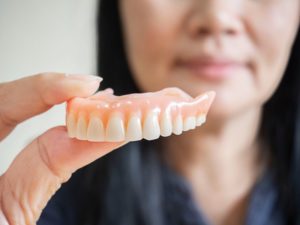
Dentures are handcrafted by master laboratory technicians, meaning you may need to wait up to four weeks for your final prosthetic. However, the moment you’re finally able to put them in your mouth will be priceless, erasing all of your concerns and doubts related to the gaps in your smile. When you get to wear your new, natural-looking replacement teeth, you’ll feel a newfound sense of confidence, but for the next 30 days, you’ll undergo an adjustment period before they become a natural extension of your smile. Read on to learn what you can expect during this time.
The First Day
As soon as you get your dentures, your dentist will ask you to wear them for the first 24 hours, even when you go to bed. In some cases, especially if you’ve been living without teeth for a while, they may even recommend you take over-the-counter pain medication as your facial muscles and tissues get used to supporting your new prosthetic. You’ll also only be able to eat a soft diet, so be sure to stock your refrigerator and pantry with foods like yogurt, mashed potatoes, and smoothies before your appointment with your dentist!
The First Two Weeks
After your first 24 hours with your dentures, your excitement may subside, and you might be more likely to notice the effects of the prosthetics. Know that it’s completely normal to develop sore spots on your gums as well as produce excess saliva. Just like breaking in a new pair of shoes, your dentures may rub certain areas of your gumline, but with time, any sores that form will heal. If the discomfort is impacting your desire to eat, you may want to invest in protein drinks, like Ensure, to get all of the necessary vitamins and calories you need for the day.
If you experience severe discomfort, however, contact your dentist to make sure that your prosthetics properly fit atop your gumline. If necessary, they may make small adjustments to improve the feel and function of your replacement teeth.
After Two Weeks
Once your facial muscles have had a chance to strengthen from regular use of your dentures and your soft tissues have healed, you’ll have better control over them, making them feel more natural. You may notice that you have a new lisp when talking or that your prosthetic slips when you try to chew. These are all normal adjustment side-effects. Keep practicing using them by reading out loud and cutting chewier foods into smaller, more manageable pieces.
After 30 Days
Typically, adjusting to dentures takes about a month. After this time period, your prosthetic will begin to feel and function more naturally. You’ll need to maintain good dental hygiene by brushing them using denture-safe products at least once a day and storing them in room temperature water as you sleep. This will prevent them from smelling, becoming discolored, and causing oral infections. With the right care, your new smile can last you for years to come!
About the Practice
At Brown, Reynolds, Snow, LeNoir Dentistry, our patients are able to benefit from the expertise of five highly skilled and experienced dentists. Together, they provide a wide range of tooth replacement solutions, from traditional, tried-and-true dentures to start-to-finish implant dentures. Through every step of the way, our team walks patients through what they can expect, helping them achieve ideal outcomes and taking the anxiety out of investing in a procedure. For questions or to schedule an appointment, visit our website or call 804-288-5324.


